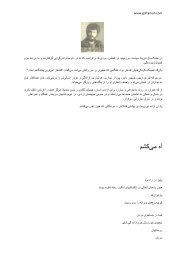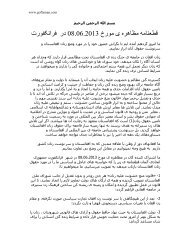Power-Sharing - Goftaman.com
Power-Sharing - Goftaman.com
Power-Sharing - Goftaman.com
- No tags were found...
You also want an ePaper? Increase the reach of your titles
YUMPU automatically turns print PDFs into web optimized ePapers that Google loves.
• Counternarcotics development strategies must be <strong>com</strong>prehensive, not make-workprograms. “Alternative livelihoods” need to include <strong>com</strong>prehensive ruraldevelopment, including electric power, water, roads, credit, debt relief, agriculturalextension, and non-farm employment, particularly in rural industries.Counternarcotics policy must also address the macroeconomic measures neededto minimize the negative effect of this sector’s contraction on the whole economy.Such policies need over a decade to be<strong>com</strong>e fully effective.This goal focuses on reducing the harm to the stability of Afghanistan, rather thanfollowing the illusory course of trying to solve the problem of drug consumption—whichdeveloped countries have not been able to solve with all the resources available to them—in the world’s weakest state. Hence, the I-ANDS and the Afghan government’s newDrugs Control Policy propose a “pro-poor” counternarcotics policy that focuses initiallyon interdiction, law enforcement, institution building, and building licit livelihoods, whileinvesting in infrastructure, protection of rights, and an enabling framework for privatesector growth that will make it possible to raise welfare while phasing out dependence oncriminal activity. Crop eradication, which the U.S. Congress in particular views ascritical, despite massive evidence to the contrary, raises the farm price of opium, createsincentives for production in remote high-cost areas, and raises the value of traffickers’inventories. Eradication in Afghanistan has led to abuses such as the sale of daughters byopium farmers to pay debts owed to traffickers. 26Re<strong>com</strong>mendations:• To assure that counternarcotics and economic development both contribute tostabilizing Afghanistan, the United States and other donors must support theintegrated approach of the I-ANDS.• The U.S. government should support the Afghan government’s National DrugsControl Policy. Congress should not undermine these efforts by insisting on U.S.contracting, earmarking for particular projects or causes, such as aerial eradicationper day (for which data are not yet available). Pro-poor growth is important because the few rich willotherwise monopolize most of the benefits of investment.26 Farah Stockman, “Afghan Women Pay the Price for War on Drugs,” Boston Globe, September 29, 2005.33
















